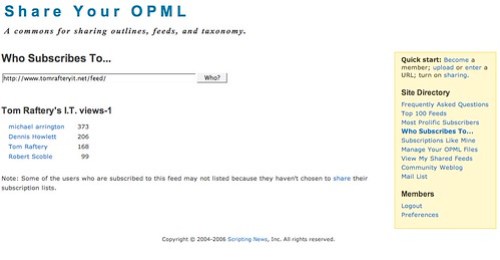OPML is a file format which is used to save lists of RSS feeds. Very handy, for instance, for copying your list of RSS feeds from one feed reader to another. I uploaded a list of my RSS subscriptions to an OPML file on this server so the Grazr plugin in the sidebar on the right can display them similar to a blogroll.
James Corbett, Ireland’s OPML ambassador, recently advised me to add autodiscovery of OPML to this site. Adding OPML is as simple as adding the following line to the head section of the site’s code:
Why would you want to add OPML autodiscovery to your page code? Frankly, apart from making finding your OPML file easier, I’m not entirely sure!
There’s a Firefox plugin, which lights up a blue icon in the Status bar when you browse to a site which has added the autodiscover code allowing you to view the site owners subscriptions.
There’s a bit of work involved in the management of OPML files. I’m always updating the RSS feeds in my reader adding new feeds and deleting old ones so any OPML file I upload is almost immediately out of date. If there were some way I could have my RSS reader synch with the remote OPML file, that would reduce a lot of the overhead.
Then again, I don’t want to publish all my RSS subscriptions (some are client sensitive) so I’d need some way of synching a subset of my feeds to my OPML file to ensure that the OPML file I’m publishing is an accurate reflection of my current reading.

